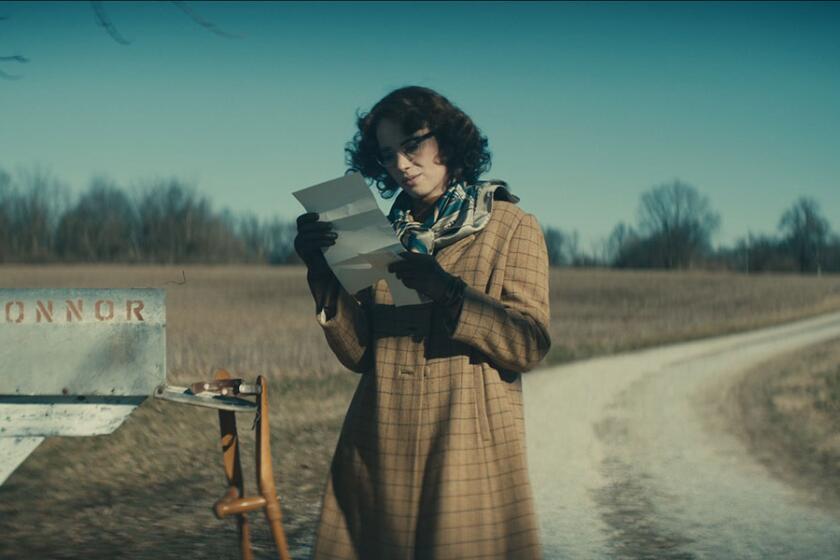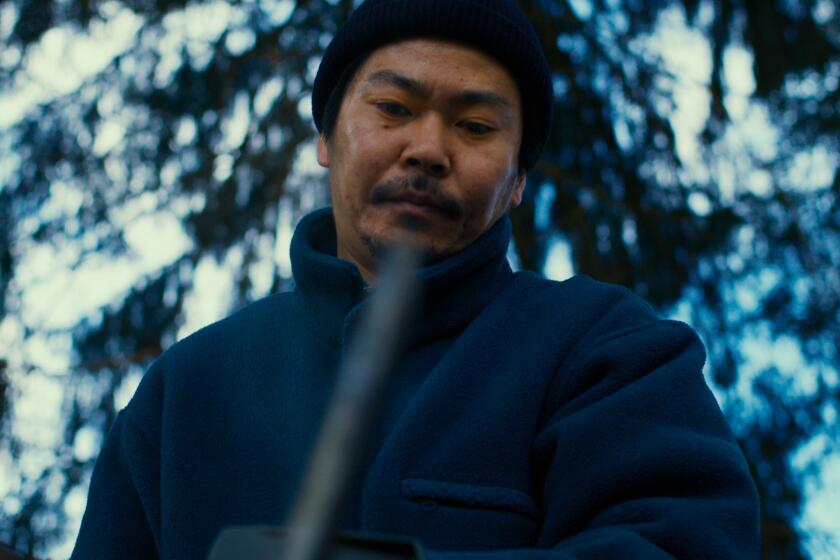SCREENING ROOM : Two Powerful Offerings Open Iranian Cinema Fest
The UCLA Film Archive’s “Recent Iranian Cinema” series commences Saturday at 7:30 p.m. with Rakhshan Bani-Etemad’s “The Blue Veiled,” a compassionate, leisurely story of a lonely, wealthy, 60ish widower, Rasul (Ezzatolah Entezami), who finds himself attracted to a poor young woman, Nobar (Fatemeh Motamed-Aria). She has become one of his many employees at his tomato farm and processing plant, where he is much-respected as a kind and generous man. Ever so gradually, Bani-Etemad allows us to realize just how conservative contemporary Iranian society is when the mere notion of a man marrying a much-younger woman of a lower class is an invitation to a major scandal.
Screening Sunday at 7 p.m., Dariush Mehrjui’s “Pari” is an extraordinary film by any measure from one of Iranian’s finest, most critical veteran directors, whose films include the controversial neorealist masterpiece “The Mina Cycle” (1977). “Pari” is a powerful and courageous allegory in which an elderly man’s selling of his blood symbolizes the Shah’s exploitation of his poorest subjects. If somewhere along the way “Pari,” a study of a young man (Ali Mosaffa) determined to save the sanity of his sister (Niki Karimi, in the title role), who is in the grip of a profound spiritual crisis, evokes thoughts of J.D. Salinger, don’t be surprised. “Pari” is in fact an ambitious and successful reworking of none other than “Franny and Zooey.”
Mehrjui evokes the elegantly shabby world of a faded aristocratic Teheran family in which its brilliant adult children carry introspection to the level of self-destruction. In its unique and deeply moving way, “Pari” is a call for emotional balance, a warning that a spiritual awakening can lead to a dangerous self-absorbed egoism. It’s no wonder that Iran’s currently most-acclaimed filmmaker, Abbas Kiarostami, calls “Pari” “one of the best Iranian films till now.” (310) 206-FILM.
Back to New England: Writer-director John O’Brien has followed up his beguiling 1993 romantic comedy “Vermont Is for Lovers” with an equally delightful “mockumentary,” “Man With a Plan,” which the American Cinematheque at Raleigh Studios will present Thursday at 8 p.m. as part of its Alternative Screen programming. Like the earlier film, it celebrates the timeless beauty of New England landscapes, its appealing images underlined by a rich score that’s folksy without being corny.
What’s a 73-year-old retired Tunbridge, Vt., dairy farmer with arthritic knees, a 95-year-old father in need of a $28,000 hip replacement and a home he’s in danger of losing to do? Why, run for Congress, of course.
O’Brien once again displays his knack of getting his neighbors to pretty much play themselves with an admirable lack of self-consciousness and lots of enthusiasm. Clearly, O’Brien taps into that dry Yankee sense of humor. At any rate, the real Fred Tuttle, retired dairy farmer, plays a Fred Tuttle embarking on a fictional run to displace Vermont’s longtime U.S. Representative, William Blachly, a genial politician with leonine looks who in effect plays himself so smoothly it’s worrisome (which is part of the picture’s point). While “Man With a Plan” satirizes contemporary campaigning excesses with great gusto and some hilarity, it does leave us concerned about how the Tuttles and their elderly friends are making ends meet in real life.
The American Cinematheque’s “Slapstick and Kisses: A Tribute to Alfonso Arau” continues at Raleigh Studios with the Mexican writer-director-actor’s “Calzonzin Inspector” (1974), which screens Friday and Saturday at 7 p.m. It’s a rambling, easy-going transposition of Gogol’s “Inspector General” to a picturesque town in what looks to be the ‘30s. Arau stars as an indio mistaken for a government official expected to arrive imminently to delve into the community’s casual but widespread corruption. This is a sunny picture, filled with gorgeous vistas, as are Arau’s “Like Water for Chocolate” or “A Walk in the Sun,” yet Arau deftly reminds us of the unjust exploitation of the peons, amid much farce and satire. Since so much of the film’s humor is verbal “Calzonzin Inspector” will seem funniest to Spanish-speaking audiences, but on the whole its high spirits, buoyed by good English subtitles, transcend language barriers. (213) 466-FILM.
More to Read
Only good movies
Get the Indie Focus newsletter, Mark Olsen's weekly guide to the world of cinema.
You may occasionally receive promotional content from the Los Angeles Times.






